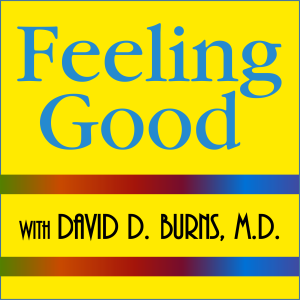
Feeling Good Podcast | TEAM-CBT - The New Mood Therapy
Health & Fitness:Mental Health

100: The New Micro-Neurosurgery — A Remarkable Interview with Dr. Mark Noble
 2018-08-06
2018-08-06
The famed neuroscientist, Dr. Mark Noble, from the University of Rochester, has developed a strong interest in TEAM-CBT and has visited our Tuesday group and Sunday hikes on three occasions this year. I (David) feel very fortunate to have his collaboration and interest!
Mark is a Stanford-trained geneticist and molecular biologist who is considered one of founders of the field of stem cell research. He has been developing a model of how TEAM-CBT affects the brain, and graciously agreed to present his model at our Tuesday evening Stanford TEAM-CBT seminar last week. Although his model is not yet fully polished and refined, and involves considerable speculation, it is an exciting first step, kind of like the time when astronomers broke away from the Catholic church and started trying to make sense of the universe. In this instance it is the “inner universe” Dr. Noble, all of us, are trying to understand. His model will evolve and get more and more refined over time.
The participants in the seminar really liked his concept that we are doing micro-neurosurgery for depressed patients with TEAM-CBT! He is convinced that the rapid recovery we see with TEAM-CBT will probably never be equaled by medication, since the brain circuits that modulate happiness and unhappiness tend to use the same neurotransmitters. But with language, you can affect brain circuits far more selectively and effectively, almost like a micro-neuro-surgeon.
Dr. Noble describes brain function in terms of the SNEFF model. This stands for Structures, Networks, Emotions, Frames and Filters, and links these concepts to the prefrontal cortex, amygdala and sympathetic nervous system. Then he describes the four steps of TEAM (T = Testing, E = Empathy, A = (Paradoxical) Agenda Setting, and M = Methods), and links each step to the SNEFF model, making interesting speculations on how TEAM works and what makes it so effective.
Dr. Noble also discusses David’s “fractal” theory about psychotherapy and relates that to brain function as well as to the mathematics of complex structures. He describes how and why some people get stuck in the “homeostasis” of chronic, refractory depression and explains why TEAM-CBT is usually able to trigger sudden and dramatic changes in the brain, as well as in the way the depressed and anxious individual thinks, feels, and behaves. He also explains why conventional talk therapy is unlikely to be helpful for individuals struggling with depression and anxiety, and may, in some cases, make the depression worse.
This is because neurons that “fire together wire together.” In other words, if you go to therapy and complain or emote about your life and your problems over and over, without taking action to change, the circuits in your brain that support complaining and feeling depressed will just get more and more intensely wired together.
Dr. Noble also speculates on why Paradoxical Agenda Setting is such an important key in ultra-rapid-recovery and in the sudden transformation of brain function as well.
Years ago, when I was kid on vacation in Minnesota, I saw an article in a small newspaper published in a rural area. A local scientist had speculated that one day we would have guided missiles and satellites and drew a simple diagram for the newspaper of how they would work. At the time it seemed a bit like science fiction, and I wondered if an unknown scientist from a small rural Minnesota town could actually predict a major scientific development. But now we see that he was right.
Will we someday think about Dr. Noble in the same way? Listen to this exciting podcast, and you can decide for yourself!
More Episodes
 2021-03-01
2021-03-01
 2021-02-15
2021-02-15
 2021-02-08
2021-02-08
 2021-02-01
2021-02-01
Create your
podcast in
minutes
- Full-featured podcast site
- Unlimited storage and bandwidth
- Comprehensive podcast stats
- Distribute to Apple Podcasts, Spotify, and more
- Make money with your podcast
It is Free
- Privacy Policy
- Cookie Policy
- Terms of Use
- Consent Preferences
- Copyright © 2015-2024 Podbean.com


